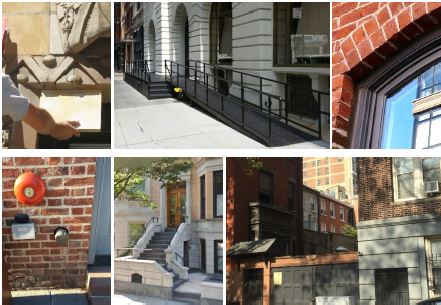This past Tuesday, March 27th, the Landmarks Preservation Commission held a public hearing on a new set of rules the agency has proposed to streamline the process of making changes to designated historic buildings. An overview of the proposed rules amendments may be found on the LPC’s website, along with a full copy of the 131-page proposed text.
The LPC Rules are a critical document that governs the level of review required in order for the agency to grant several types of permits. If a proposed project complies with the rules, a Certificate of Appropriateness permit may be issued by the staff. Projects that are less cut and dry, often with a larger scope of work, are reviewed by the full Commission at a public hearing. This process involves review by local Community Boards, local stakeholders and neighbors, and the preservation community who may weigh in on the projects via advisory testimony at the hearing. The rules, as proposed, would re-route a significant number of applications to staff review rather than going to a full public hearing before the Commissioners.
FRIENDS has read and analyzed the Commission’s proposed text and offered testimony at the public hearing. Click HERE to read FRIENDS’ full testimony, which has been submitted to the LPC for review. While we appreciate the Commission’s desire to codify determinations routinely being made by LPC staff and to expedite the application process for the benefit of the volunteer Commission’s time, it seems that the only clear justification for the changes to these rules is a customer-fronting efficiency that will ease this process for applicants and their architects.
In addition to our concerns regarding the physical ramifications for historic structures, the justification for and genesis of the proposed new rules, and their lack of clarity and explication for implementation, one of our strongest concerns has to do with the lack of transparency fostered by the proposed rules.
We feel strongly that the public, including dedicated Community Boards, the professional preservation community, and local stakeholders, deserves a larger role than backseat observation. The engaged and spirited public review process is one of the most valuable and constructive safeguards for the citywide character of historic districts, and any proposal to streamline the process must start with that premise.
Here’s how YOU can help:
Speak up! Tell Landmarks to keep the public in public process. Submit written comments to the LPC regarding the rules changes by TUESDAY, MAY 8, 2018.
Comments may be submitted by mail to “LPC, Municipal Building, One Centre Street, 9th Floor, New York, NY 10007″, by email to nycrules@lpc.nyc.gov, by fax to (212) 669-7797, or by online submission through the NYC Rules website at www.nyc.gov/nycrules.
- “The Landmarks Preservation Commission’s proposed rule changes, explained,” by Evan Bindelglass, Curbed, March 23, 2018.
- “Overhaul of Landmarks rules faces criticism from preservation groups,” by Devin Gannon, 6sqft, March 23, 2018.
- “Landmarks Preservation Commission begins overhaul of application process,” by Joe Anuta, Crain’s, March 1, 2018.


